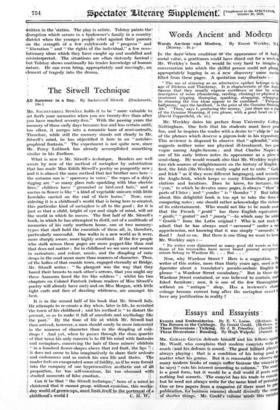Words Aficient and< MC - idern Words Ancient and Modern. By Ernest
Weekley, (Murray. -- 6s.
Ix the daff4lien erudition= l!if the appearance of it had Social Value, a gentleman could have dined out for a week o Mr. Weekley's book. be very hard to imagine ticonversation into which the skilful person could not plung4 appropriately lugging in as „a. new discovery' some matte lifted from these pages. A quotation may illustrate:- " The use of stunning as an admirative, epithet belongs to tb ago of Dickens and Thackeray., It is characteristic of the Anglo. Saxons that they usually express excellence or size by son; descriptive of noise (thundering, rattling, clinking) or physical it treatment (ripping, thumping, spanking, strapping, whopping' In stunning the two ideas appear to :be combined. Tvicipencs halfpenny,' says the landlord, ' is the price of the Genuine Stunning Ale.' Then, says I, producing the money, ' just -draw me-a glaa of the Genuine Stunning, if you please, with a good head on WI
(David Copperfield, ch. xi.) ..- •
Mr. Weekley dates his . preface from University Collegt, Nottingham. One feels that his students 'must have great fun, and he inspires the reader with a desire to " chip in" of the phrases which deserve a pigeon-hole in his repository), This reviewer is disposed to observe that " splendid," whk suggests neither noise nor physical ill-treatment, has god vogue among Anglo-Saxons ; and that Charles • Napier one of his early letters notes its appearance as a piece d 'semi-slang. He would remark also that Mr. Weekley negleelt two' rich sources of enlightenment on the history of English first, the IrishlMr.Weekley really ought not to Write " Gaele and Irish" as if they were different languages), and secondlt the Anglo-Irish, which keeps so many Elizabethan' prom* ciations and locutions. Does he know, for instance, t "yon," to which he devotes some pages, is always "thon" parts of Ulster ; 'and "yonder " is " thonder " ? But talking about this delightful book is too apt to take the -form comparing notes ; one should rather acknowledge the rielincs of its entertainment. Who would not' like to be made awe that the French " gentil " has three English equivalents: " gentle," " genteel!' and " jaunty "—to which may be added " Gentile " from the Latin original ? Who is_ not ready to admit that he has always used " surround " under a m' apprehension, not knowing that it was simply " suronder," ea flood ? And so on. But there is one thing we want to know, Mr. Weekley says :— " No writer ever disinterred a° many, good old words as Sot Some. of his trouvaillea have never found general acceptanci others belong to Wardour St. . . . But . . .'
Now, why Wardour Street ? Here is a suggestion. Tie writer of this notice, more than thirty years ago, used in tk Spectator about a translator's pseudo-archaic English tk phrase " a Wardottr Street vocabulary." But in those dap Wardour Street contained, or was believed to contain, In faked furniture ; now, it is one of the few thoroughfalo without an " antique " shop: Has a reviewer's coinage become current long after the metaphor -ceased have any justification in reality ?


























































 Previous page
Previous page